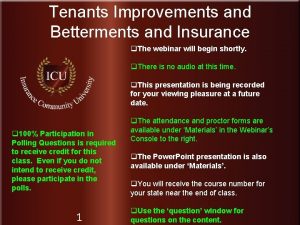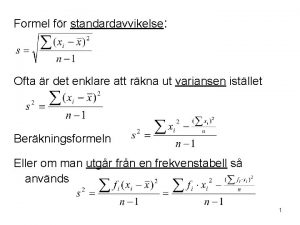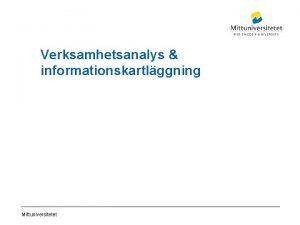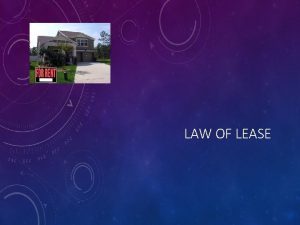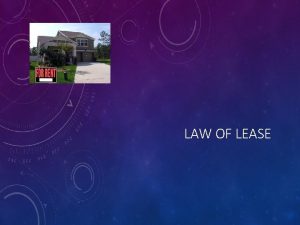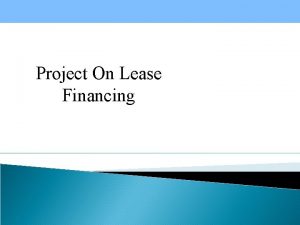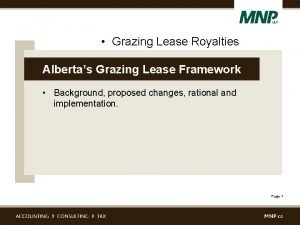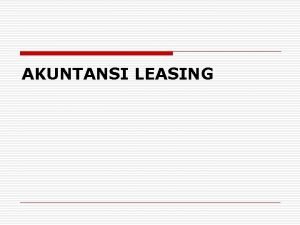Lease Renewal for Tenants a Snapshot Lease Renewal














- Slides: 14

Lease Renewal for Tenants: a Snapshot Lease Renewal Procedure under the Landlord and Tenant Act 1954 (the “Act”) Nadia Milligan, Counsel Development Hilton Worldwide Legal Department

A Tenant’s Statutory Right to a New Lease Security of Tenure under Part II of the Act ‘Security of Tenure’ means that: 1. A tenant has the right to apply to court for a new lease; and 2. A tenant has the right to remain in occupation at the end of the contractual term of a lease. Meaning - The lease will continue on the same terms and conditions as the contractual lease until it is terminated in one of the ways specified by the Act. HILTON LEGAL 1. xxx 2. xxx 3. xxx Notes: xxx Source: xxx Footer LEGAL AND COMPLIANCE TRAINING © 2015 Hilton Worldwide Confidential & Proprietary 1

A Tenant’s Statutory Right to a New Lease Qualifying Criteria for a Tenant to have Security of Tenure A tenant who has a commercial lease will have security of tenure if: The tenant occupies the premises; The tenant occupies the premises for the purposes of a business; and The lease has not been contracted out/excluded from the Act. HILTON LEGAL AND COMPLIANCE TRAINING © 2015 Hilton Worldwide Confidential and Proprietary 2

Initiating the Renewal Procedure Under the Act Procedure Must be Conducted Between the Tenant and the ‘Competent Landlord’ Section 25 Procedure Section 26 Procedure Landlord initiates procedure Tenant initiates procedure • Allows the landlord to start a procedure which will either grant a new lease to the tenant or in the tenant vacating • Must be served not more than 12 months nor less than 6 months before the contractual expiry of the current lease • Cannot be served after the tenant has served a s 26 notice • Landlord must comply with statutory requirements • The Landlord should specify the proposed termination date of the current lease in the s 25 notice • Must be served by the tenant’s ‘Competent Landlord’ • Must be served not more than 12 months nor less than 6 months before the contractual expiry of the current lease • Cannot be served after the Landlord has served a s 25 notice • Landlords have a right to object and regain possession on certain specific grounds (rare for landlords to object) • The tenant should specify the proposed commencement date of the new lease in the s 26 notice. HILTON LEGAL AND COMPLIANCE TRAINING © 2015 Hilton Worldwide Confidential and Proprietary 3

Example – Understanding when a s 25 or s 26 can be validly served Tenant’s Lease Expires 31 December 2016 Landlord serves s 25 notice VALID. 11 months prior to the expiry of the contractual term of the lease Landlord serves s 25 notice 31 January 2016 25 March 2016 Tenant has already served a valid s 26 notice. Invalid. 31 August 2015 Tenant serves s 26 notice 15 months prior to the expiry of the contractual term of the lease. Invalid. HILTON LEGAL AND COMPLIANCE TRAINING © 2015 Hilton Worldwide Confidential and Proprietary 4

Serving a Valid Section 26 Notice Tenant Initiating Renewal – Statutory Requirements for Service of the Section 26 Notice Service on the ‘Competent Landlord’ Service by the tenant Validly serve the notice Section 26 Notice © 2015 Hilton Worldwide Confidential and Proprietary Timing of service Use prescribed form of notice 5

How do you Identify the ‘Competent Landlord’ Obtain official copy entries from the Land Registry A ‘Competent Landlord’ is: 1. The first party in the leasehold structure with an interest in the property; and Consider serving a ‘Section 40 Request’ 2. That interest is either: a) Freehold; or b) Leasehold with more than 14 months left to run. © 2015 Hilton Worldwide Confidential and Proprietary 6

Example – Identifying the Competent Landlord Immediate Landlord 1 – lease expires 31 December 2016 Tenant’s lease expires 31 December 2015 Superior Landlord 2 – lease expires 31 December 2019 = ‘Competent Landlord’ Superior Landlord 1 – lease expires 31 January 2016 © 2015 Hilton Worldwide Confidential and Proprietary Freeholder 7

Section 26 Lease Renewal How do you Validly Serve a Section 26 Notice? • Leaving the notice at the last place of work or residence/register ed office • Obtain proof of delivery e. g. courier • Recorded delivery or special delivery Personal service Registered post Other methods of service Methods of service prescribed by the lease • © 2015 Hilton Worldwide Confidential and Proprietary e. g. fax 8

Section 26 Lease Renewal The Prescribed Form of the Section 26 Notice Tenant’s request Notice must contain all three parts Schedule containing terms for a new lease Important note for the landlord © 2015 Hilton Worldwide Confidential and Proprietary 9

Section 26 Lease Renewals Landlord’s Counter Notice of Opposing Renewal Specify grounds in S 30(1) of the Act Form of Notice Timing © 2015 Hilton Worldwide Confidential and Proprietary • The landlord requires the premises for development purposes or to occupy himself/itself. • The tenant has a history of noncompliance. • If the premises have been split and sublet, where the whole premises would command a higher rent if let under one lease. • No prescribed form. • Must be in writing. • Must be served within 2 months of the Tenant serving a section 26 notice. • If the landlord misses this deadline, it will no longer have a statutory right to object to the grant of a new lease. 10

Section 26 Lease Renewal Applications to Court to Determine the Terms of the New Lease Either party can initiate applications to Court Deadlines for making Court applications – ‘statutory period’ © 2015 Hilton Worldwide Confidential and Proprietary Court application procedure – obtain legal advice 11

Section 26 Lease Renewal Negotiating the Terms of the New Lease Without going to Court/Court proceedings ongoing Mark correspondence on a “without prejudice” basis Mark correspondence “subject to contract” Save costs and mitigate your relationship with your Competent Landlord HILTON LEGAL AND COMPLIANCE TRAINING © 2015 Hilton Worldwide Confidential and Proprietary

Re-Cap Step-by-Step: Practical Steps to Lease Renewal by a Tenant under the Act 1. Check the contractual expiry date of the lease. 2. Consider whether the tenant qualifies for security of tenure. If it does not, it has no statutory right to a new lease under the Act. 3. Confirm the identity of the “Competent Landlord”. 4. Approach the Competent Landlord to establish whether the Competent Landlord agrees to grant a new lease. 5. Check whether any notices have already been served under the Act. If the Competent Landlord has already served a valid section 25 notice, the tenant cannot serve a section 26 notice and vice versa. 6. Note the deadline for making an application is the end of the “statutory period”. This is the termination date specified in the section 25 notice, the day before the commencement date specified in the section 26 request or the date specified in the last of any agreed extensions of this time limit. 7. If neither party issues a claim before the expiry of the “statutory period” or any agreed extension to this, then the lease will terminate when the statutory period expires and the tenant will have no right to remain in the premises. The Competent landlord may take steps to recover possession of the premises. HILTON LEGAL AND COMPLIANCE TRAINING © 2015 Hilton Worldwide Confidential and Proprietary
 Operating lease vs finance lease
Operating lease vs finance lease Lease renewal gp surgery
Lease renewal gp surgery Principles of marxism
Principles of marxism Tenants improvements insurance
Tenants improvements insurance Nevada habitability law
Nevada habitability law Standardavvikelse formel
Standardavvikelse formel Ledningssystem för verksamhetsinformation
Ledningssystem för verksamhetsinformation Tack för att ni har lyssnat
Tack för att ni har lyssnat Centrum för kunskap och säkerhet
Centrum för kunskap och säkerhet Läkarutlåtande för livränta
Läkarutlåtande för livränta Treserva lathund
Treserva lathund Returpilarna
Returpilarna Inköpsprocessen steg för steg
Inköpsprocessen steg för steg Påbyggnader för flakfordon
Påbyggnader för flakfordon Tack för att ni lyssnade
Tack för att ni lyssnade



